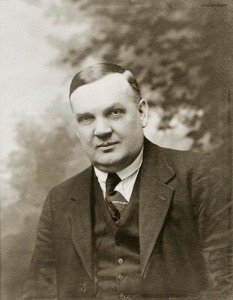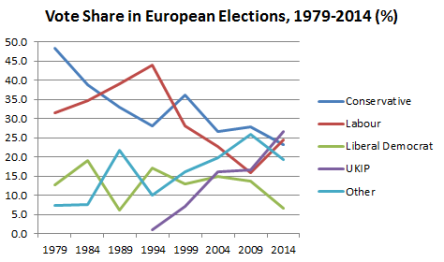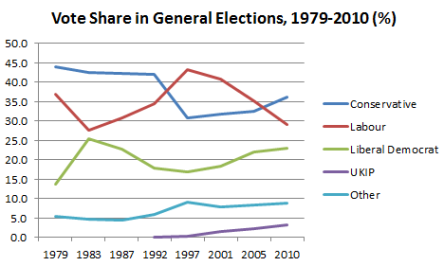There are currently thousands of Parliamentary candidates campaigning across the UK for the right to represent their communities’ interests in one of the 650 seats in the House of Commons. The majority of these contenders will be disappointed in their ambitions, however intelligent, compassionate, zealous, or hard-working they are. Success in politics often rests upon the correlation of the individual’s skill and the right circumstances. Some, unfortunately, will always be in the wrong place at the wrong time.
In this season of strenuous electioneering, I am reminded of the example set by my great-great uncle, Ernest Stanford CBE (1894-1966). He died long before I was born, but he has always been celebrated as the only politician of note in my family. Contesting seats at general elections three times in the 1920s and 1930s, he never entered Parliament. But as a local politician and charity fundraiser he had the satisfaction of knowing he had left the world better off than he found it. I hope that his story will be of some inspiration and consolation to those industrious and sincere candidates who will fail at the forthcoming election.
Ernest was born in 1894 in Horsham, Sussex. His paternal grandfather had been a farmer while he followed his father into the butcher’s trade. During the First World War he served in the Royal Army Medical Corps and was involved in the Gallipoli campaign, though invalided home with enteric fever. Later he was connected with the Egyptian Expeditionary Force and was on the Western Front by the end of the conflict.
Aged around 23 he was moved to join the Independent Labour Party, then dominated by its leader Ramsay Macdonald. Ernest would venerate Macdonald and follow him on his controversial political journey. After returning from the war, in 1919 he helped to establish the Crawley Labour Party.
In the 1923 election he was selected as the Labour candidate for Horsham and Worthing. His sole opponent was the incumbent Conservative MP, Earl Winterton. The Tories had held the seat continuously since 1880 and Winterton had been first elected in 1904, so Ernest was always operating at some disadvantage. Indeed, the previous year Winterton had been returned unopposed. In earlier times the seat had been contested by the Liberals, but this was the first time that Labour had put forward a candidate in the constituency. The result was a convincing win for the Conservatives with 17,925 (67%) votes against Ernest’s 8,892 (33%).
Though missing the opportunity to be a part of the first Labour Government under Macdonald’s leadership, Ernest did not abandon his hope of entering Parliament. When another general election was called the next year, Ernest prepared to fight once more. The Times, reporting on campaigning in Sussex noted that Winterton was expected to stand, commenting that
‘Socialism is being represented by Mr. Ernest Stanford, who suffered something approaching annihilation last time, though Sussex Socialists have the utmost regard for his fighting qualities’ (15 October 1924, p. 8)
If anything, the result was even more firmly in favour of Winterton who, on an increased turnout, gained a considerable 76% of the vote (23,715), with Ernest’s share reduced to 24% (7,537).
Ernest’s next battle was against the radicals in his own party. He was deeply concerned that the electorate consistently confused Socialism with Communism, and he was right to be worried. Just before the 1924 election the ‘Zinoviev letter’ appeared, suggesting that if a Labour Government resumed diplomatic relations with Soviet Russia it would hasten the radicalization of the English working class. Although Labour would probably not have won a majority in any case, it damaged the perception of the party. Ernest was determined to stamp out any suggestion of Communist sympathy in the British Labour party. Writing an open letter to the delegates attending the 1925 Labour conference, he urged them to officially reject Communism and to bar avowed Communists from being members of the Party.
‘We of the Labour Party ought to realise,’ he wrote, ‘that work, hard work, and still harder work is the only way to regain lost markets and to restore Overseas’ trade, and in following this remedy Labour will lose none of its dignity.’
Although a resolution was passed to disaffiliate Communists from the Labour movement, battles between the left and right wings of the Party continued for the rest of the decade.
Ernest seems to have given the 1929 election a miss, but in October 1931 he was selected as the National Labour candidate for West Wolverhampton. This was a brave move for a Socialist politician of the time. MacDonald’s second Labour administration took office just before the crash of 1929 and the Government was soon in financial difficulties. By 1931 MacDonald believed a grand coalition of Conservatives, Liberals, and Labour was the only way forward and called a general election to endorse the National Government. Only a few Labour representatives followed MacDonald’s lead. He was widely derided as an opportunist, a man who was no Socialist, who was more interested in balancing the books than the rights of the working man. The last straw was his acceptance of the recommendation to cut unemployment benefit by 10% (a move incomprehensible in modern politics, even in the depths of austerity).
As a result of Ernest accepting the National nomination he was expelled from the Crawley Labour group that he had helped to found over a decade earlier. In spite of this, Ernest was still an eager follower of MacDonald, even consenting to withdraw from Wolverhampton on nomination day to avoid splitting the National vote and to allow the Conservatives a reasonable chance of recapturing the seat from Independent Labour. He then threw his energies to campaigning on behalf of Macdonald in his constituency of Seaham in County Durham, not that this was an easy option.
On arriving in MacDonald’s constituency he was informed by a railway clerk that no working man could openly support the Prime Minister without being shunned by his neighbours and colleagues. Nonetheless, after a fortnight of intensive campaigning, the tide began to turn in MacDonald’s favour. Ultimately he got home with a majority of 6,000.
Ernest’s efforts as MacDonald’s acolyte in Seaham did not go unnoticed. On 3 June 1933 he was appointed a Commander of the Civil Division of the Order of the British Empire (CBE) for public and political services as a member of the executive of the National Labour Committee. In October the same year he also persuaded MacDonald to come down to Crawley to give a speech.
For the 1935 election, Ernest secured the National nomination for Southwark Central. By his own account, Ernest had a tough time of it contesting the seat. Independent Labour activists attended his meetings armed with megaphones, shouting him down whenever he attempted to address the crowd. His Socialist opponents released a pamphlet the day before polling claiming (wrongly) that if a National government was elected every man’s wage would be reduced by 4s 8½d per week. Demonstrations of men wearing gas masks parading on Armistice Day did not help matters. When it came to it, Ernest performed better at the polls than ever before, capturing almost 10,000 votes (a 47% share), but this was not enough against the Labour candidate and former MP Harry Day (with 11,000 votes, 53%).
In June 1936 Ernest’s name was mentioned as a possible National candidate for the Derby by-election but nothing came of it. After this he seems to have lost his appetite for Parliamentary contests. Following MacDonald’s death (November 1937) Ernest still continued to work for the National Labour Organisation and in 1939 he was elected to its Executive Committee, representing the National Labour Candidates’ Association.
It was during the 1930s that he began to pursue other interests. Utilising his persuasive and organizational skills he served as the National Appeals Organiser for the British Empire Cancer Campaign (1932-1939), now Cancer Research UK, at a time when fundraising for cancer charities was in its infancy. At the start of the Second World War he diverted his attention to organising appeals for St Dunstan’s, the institution for blind war veterans, a responsibility he undertook for the next 20 years.
Ernest did not lose his interest in politics but now concentrated on local issues. In 1947 he became Chairman of Crawley Parish Council, the year after the New Towns Act had identified Crawley as a site for radical development. The plans envisaged the small town growing from a population of 9,000 to 40,000 by the early 1960s. Ernest had an important role to play in this as vice-chairman of the Crawley Development Corporation during the 1950s. Never marrying, he died in April 1966 at his home at Angmering-on-Sea, named reverently if tastelessly ‘Stanwells’ (a combination of his surname and his mother’s maiden name Wells). In its small obituary, The Times took most notice not of his failed political ambitions, but his charitable endeavours.
Though he never achieved his dream of entering Parliament, Ernest served the local community and its institutions. He helped to transform Crawley (for better or worse) from a small town with satellite villages into one of the urban areas needed for Britain’s expanding postwar population. His work in fundraising for cancer research and blind servicemen made a real difference to the sick and wounded.
The lesson I wish to give to those electoral candidates who will inevitably fall short on polling day is that elections are not everything. You all wish to help the people in your communities and across the country and you believe that you have the skill and determination to do this. And even if you fail in your aim, you can still serve your country, your community, your neighbours. It may be that your constituents’ loss may be another’s gain.



